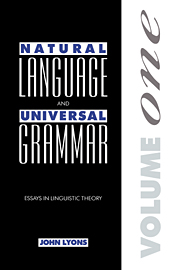Book contents
- Frontmatter
- Contents
- Preface
- Typographical conventions
- 1 Language, speech and writing
- 2 In defence of (so-called) autonomous linguistics
- 3 Linguistic theory and theoretical linguistics
- 4 Natural, non-natural and unnatural languages: English, Urdu and other abstractions
- 5 The origin of language, speech and languages
- 6 Phonemic and non-phonemic phonology: some typological reflections
- 7 Towards a ‘notional’ theory of the ‘parts of speech’
- 8 Deixis as the source of reference
- 9 Deixis and anaphora
- Appendix: The scientific study of language. Inaugural Lecture, Edinburgh, 1965
- Notes
- References
- Subject index
- Names index
2 - In defence of (so-called) autonomous linguistics
Published online by Cambridge University Press: 05 June 2012
- Frontmatter
- Contents
- Preface
- Typographical conventions
- 1 Language, speech and writing
- 2 In defence of (so-called) autonomous linguistics
- 3 Linguistic theory and theoretical linguistics
- 4 Natural, non-natural and unnatural languages: English, Urdu and other abstractions
- 5 The origin of language, speech and languages
- 6 Phonemic and non-phonemic phonology: some typological reflections
- 7 Towards a ‘notional’ theory of the ‘parts of speech’
- 8 Deixis as the source of reference
- 9 Deixis and anaphora
- Appendix: The scientific study of language. Inaugural Lecture, Edinburgh, 1965
- Notes
- References
- Subject index
- Names index
Summary
I will begin, if I may, with a quotation from one of my own works:
One topic that commonly finds a place in discussions of the status of linguistics as a science (or has done until recently) is its ‘autonomy’, its independence of other disciplines. Linguists have tended to be somewhat insistent on the need for autonomy because they have felt that in the past the study of language was usually subservient to (and distorted by) the standards of other studies such as logic, philosophy and literary criticism. For this reason the editors of Saussure's posthumous Cours de linguistique générale (the publication of which is often taken to mark the beginning of ‘modern linguistics’) added to the text of the master its programmatic concluding sentence, to the effect that linguistics should study language ‘for its own sake’ or ‘as an end in itself’
[Saussure, 1916].The above quotation comes from the editorial Introduction which I wrote for New Horizons in Linguistics 1 some twenty years ago (Lyons, 1970a: 8). When I came to rewrite this Introduction, more recently, for New Horizons in Linguistics 2, I noted that, even when the earlier volume was being written, “there were many linguists who felt that the principle of ‘autonomy’ had outlived its usefulness”; and that “this feeling is probably more widespread today than it was then” (Lyons, 1987b: 4–5).
- Type
- Chapter
- Information
- Natural Language and Universal GrammarEssays in Linguistic Theory, pp. 12 - 26Publisher: Cambridge University PressPrint publication year: 1991



